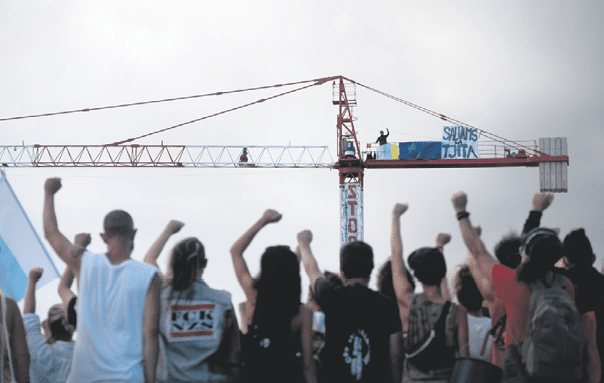
The Court of Instruction Number 3 of Granadilla de Abonathrough a car collected yesterday by Mírame Televisión, has agreed to the free dismissal and the file of the criminal case opened against the two activists who in June 2020 climbed two cranes to protest the construction of a hotel in the vicinity of La Tejita beach.
The judicial resolution, issued by Judge Arabia Díaz Carreiras, considers that there are no elements to continue the criminal investigation against the two activists for alleged crimes of coercion, usurpation and serious disobedience to authority, as requested by the promoter company J. Viqueira Lago Construcciones SA. The order, in addition to analyzing the criminal requirements of each of the crimes, weighs up the fundamental rights that protect the protest actions of the two denounced activists, Isora González and César Mesa, who remained for 11 days on the cranes who carried out work on the plot, between June 16 and 27, 2020.
In the midst of the protest, which acquired national repercussions, the Provincial Coastal Service of Tenerife agreed to the precautionary measure of paralyzing the works of the Hotel La Tejita, but the two activists continued perched on the cranes until on June 27, through a court order, their eviction was agreed to take their statements. Three days later, provisional release without bail was ordered for both.
The instruction continued pushed by the promoter, who at no time reversed its intention to criminalize the protest of the activists. Quite the contrary. The construction company requested several precautionary measures from the judge, which were not admitted. She first requested the provisional prison of those investigated or, in a subsidiary way, the prohibition of approaching La Tejita. None prospered.
With the file of the case, although there is an appeal against the order, the criminal procedure for the company J. Viqueira Lago Construcciones SA is closed, but the judge recalls that “a different thing is the economic damage that could have been caused to the complainant”, whose claim “must be made by exercising the corresponding civil actions.” During the investigation, the promoter presented a budget that estimated the costs derived from blocking the cranes at 18,402 euros.
The judge breaks down one by one the three crimes for which the two activists were being investigated to justify the lack of criminal responsibility and the filing of the case, and points out that there was “no coercion, disobedience or usurpation, the crime punishable by occupation, without violence or intimidation, of someone else’s property, dwelling or building that does not constitute a dwelling, or remains in them against the will of its owner”, according to article 245.2 of the Penal Code.
For her, “the activists’ refusal to get off the crane constitutes the materialization of their peaceful protest.” An argument that is linked to another: “Pretending that said refusal constitutes a crime of serious disobedience would not only imply an affectation of the fundamental right, but also a limitation of its exercise,” she points out in the legal foundations.
















